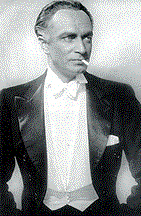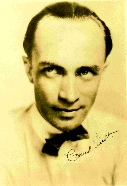We Germans kept mostly to ourselves there, in our little circle, which was composed
of the men I had known in the old Berlin days and their wives and families. Lubitsch,
Lothar Mendes, Korda, Jannings, Murnau, Leni, Paul Ludwigstein. And Maurice Stiller
and his great woman friend. What can I say of her that the world does not know?
I think she is the greatest woman in pictures. Her face is completely photogenic,
to me the most satisfying face on the screen. It is believed that her well-known
mystery and desire to be alone is all part of the most subtle publicity. Wrong.
It is natural; it is herself. As it happens, it has turned out to be the cleverest
publicity, because no actress's life has been more closely interrogated by a hungry
public. She is afraid of people. She really likes to be alone. She can be with
two or three people and he happy, alert and interested. Then she will talk with
animation and gaiety. For she has a lot of humour and can be a grand companion.
Put her in the wrong atmosphere, with the wrong people, she is unhappy, morbid,
frightened. Her face is sometimes so beautiful that it gives you a shock of pleasure;
sometimes ugly. But, of course, there ,is always that perfect bone modeling, and
the deep, deep look in the eyes. She is rare. There is some queer streak of melancholy
in her that is never absent, even when she smiles. You are conscious of it all the
time on the screen. In real life it is deeper, even more part of her. This quality
keeps her remote from ordinary things and people, up in the air. Then you find,
astonishingly, another side of her with both feet on the ground. She is wonderful
at all sports, a perfect swimmer, rider. Just as she is up in the air and down on
the ground at the same time, just as she is at once ugly and beautiful, so she is
also a mixture of masculine and feminine in her. I can best remember her on a hot
lazy afternoon when, in between pictures, she used to visit us. One or two people
would be there and we would play ping-pong or tennis, and she swam in the pool and
played with Viola, happy and relaxed. She was attractively child-like on those afternoons,
simple and sweet. She adored Viola, and Viola patronised her as babies do.... She
laughed and threw back the ball that Viola was always dropping in playing the great
baby ball-dropping game, and was a sweet child herself. She and Stiller had one
of the greatest friendships I have ever know between a man and a woman. It was more
like the perfect friendship between two men. He was not happy in Hollywood. He
left and went back home to Sweden for a holiday. It must have been the cold after
Hollywood's hot sun, but he was suddenly and cruelly taken ill, and died after a
short sickness. We never saw him again. None of us could believe it; it was a
terrible shock. He was such a great artist. There would have been no limits to
what he would have done for the screen. And so full of life, doing everything with
intense vigour and energy. He dived like a fish, played every game until he flopped
down exhausted. No half measures about him. Nobody who had known him could ever
forget him, even in death. Paul Leni, who made "Waxworks", the cause of my coming
to Hollywood, was the director of my picture, 'The Man Who Laughs', and we were all
very happy about it. It was the Victor Hugo story of the man whose lips were cut
away so that he has to go through life forever smiling, all his teeth showing in
a horrible grinning grimace. It took some months to make. Sometimes I felt "The
Man Who Laughs" never wanted to smile again.
 Conrad Veidt (c. 1933)
Conrad Veidt (c. 1933)
In the middle of my third Hollywood picture "The Magician", the earthquake hit Hollywood.
Not the real earthquake. Just the talkies. In all the confusion and turmoil that
followed, nobody knew what was going to happen. I was German. True, I was a stage
actor, and my voice was one of my assets. But who wanted a German-speaking, actor
in an English-speaking country? I thought I would be wiser to leave the earthquake
behind before it did me any harm. I folded my tents and went home with my wife and
Viola. And there perhaps for the first time in my career, the graph line began to
turn a little downward. Of course, they started to make talkies in Berlin, and I
was in them right away. But they did not know then the technicalities which can
make or ruin a talkie actor. Bad machinery can make the most beautiful voice in
the world into a squeaking horror. My first talkie over there was not at all perfect.
The talk and the silence were all mixed up. This hurt my reputation. People did
not blame the mechanics. They blamed me. They said, "Perhaps he's no good for talkies
anyhow." But my next picture, "The Last Company", directed by Kurt Bernhardt, was
almost technically perfect, and a success.
There must have been something in my nature - I believe, with all my heart,
that I have conquered it now - which prevented me from being perfectly happy or making
a woman perfectly happy. Mrs. Veidt was the perfect mother - to Viola. Viola was
- is the perfect daughter to both of us. And Mr. Veidt, like the spoilt child, felt
left out in the cold. Again, as with my first wife, I cannot explain it, cannot
make excuses. My wife was amiable, sweet, all that one could want in a woman. Viola
made me happy; she grew to be terribly important to me. But a child cannot be a
mother to a grown man. My wife, sensing the change that was talking place in me,
was hurt, naturally. Things were no longer as they had been. I thought, "Don't
spoil it. Perhaps it is just a temporary feeling. It would not be good for the
child for us to separate." But soon we both realised it would be better for the
child. At last I had to see myself face to face, soul to soul, and realise that
my complex was again nagging at me. I made several German talkies. My work graph
began to climb again. Dupont, the famed director came to Berlin. He wanted me to
come to England and make the German version of "Cape Forlorn".
I liked the idea. A new country, not too far away from homes new people, new
ideas, new work. This would give me a different slant on my home life, and give
me time to consider the best thing for me and my wife to do. So I came for the first
time to England, and, like a snap of the fingers, I felt at home. I began to learn
English.
The time arrived for me to make my first talkie in English, I was Metternich
in "Congress Dances." Until now English audiences hardly knew me; few remembered
my work in silent days. But this picture apparently, put me on the English map.
In 1932 I returned here to play in the Gaumont-British picture "Rome Express." Viola,
my daughter and my wife, were then in Vienna. "Rome Express" over, I too went to
Vienna to play on the stage in Savoir's "Lui" and to decide what arrangements we
two were going to make about Viola. For, definitely, we had agreed to part.
I wanted, more deeply that I had ever wanted anything in the world, to have
my daughter with me all of the time. You will understand what manner of woman my
wife was when I say that she would have agreed to this. Dearly as she loved Viola,
close as the tie between them she understood the significance of the relationship
between Viola and me. I had my bitterest, my most desperate struggle with myself.
Should I selfishly take Viola - and peace of mind - with me to live, with the usual
proviso that her mother should have her for certain times in the year? Or should
we make the reverse arrangement ? I thought: "Conny, life on the whole has been
good to you. If you have not found complete happiness, it is not because people and
circumstances have withheld it from you. It is something within you, some strange
twist in your mentality that has taken you up to the very door of happiness - further
than many people ever get - allowed you some tantalising glimpses of the glory within
and then shut it firm in your face."
With Viola and my talkie work I knew I should be inside that door, safely content.
That was one of the things I knew, as surely as the believer knows there is a God.
Without Viola.... Well, it was difficult to imagine life without Viola.... I knew,
too, that a child is like a flower. You take a flower from the soil, put it in a
room with the wrong temperature, it withers, dies. A child needs its mother. Viola,
this little flower, ought to stay in one place, growing up with the protection of
the mother plant. Uproot her, and what might happen? My profession and my temperament
made me, especially then, the gypsy. I never knew to what countries my work would
take me. And, with the home tie broken, I never knew to what place the fancy might
lead me. Besides, I owed a great debt to Viola's mother that I don't suppose I shall
ever be able adequately to repay. She gave me much peace of mind. We, too, remain
good friends. So we made the compromise that Viola should live with her mother,
and I should visit her whenever I wanted, and take her away with me for certain times
in the year. As for Viola, have I yet mentioned that she is nine, and growing up
most beautiful? That she has unusual intelligence? That she has already learnt when
to be gay, when to be serious? (And how important that is.) That her sense of humour
is exquisite, her temperament ideal? That she is the most divine daughter any man
could ever have.... But, perhaps you are a father or a mother yourself, so you will
know that I must be stopped at this point, or I will go on forever .....

 Conrad Veidt (c. 1933)
Conrad Veidt (c. 1933)